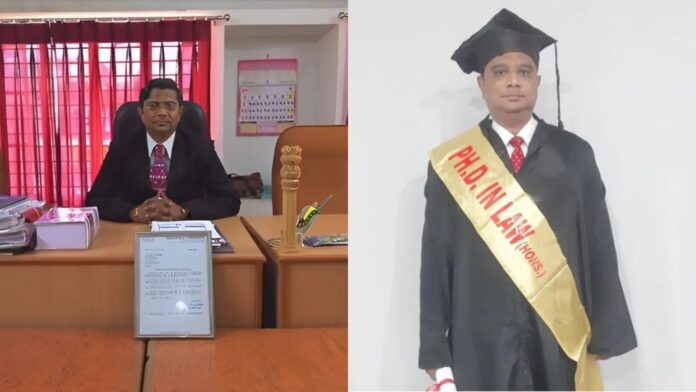Gujarat police have uncovered a scam involving a fake court, complete with a bogus judge, fake lawyers, and counterfeit legal proceedings. The operation, run by Morris Samuel Christian, highlights the cunning of con artists and the vulnerability of those seeking legal help. After previous incidents of fraudulent government offices and toll plazas, this case demonstrates how deception can thrive undetected.
The alleged operation, believed to have been running for nearly five years, was exposed when a complaint was filed by the registrar of the city civil court in Ahmedabad. The police suspect that Christian’s scheme, which involved presenting himself as a legitimate judicial authority, may have succeeded in duping multiple people since its inception. The case that led to Christian’s downfall revolved around a government land dispute that had been ongoing since 2019. He allegedly passed an order in favour of his client, making use of his fraudulent court to grant a favourable decision in the land dispute case.
According to the police, Christian posed as a judge of an arbitral tribunal and deceitfully claimed to be appointed by a legitimate court to adjudicate legal disputes. He passed favourable orders for his clients, taking advantage of the complex legal system and people’s lack of understanding of arbitration processes. This elaborate con was brought to light after the registrar, Hardik Desai, grew suspicious and conducted an investigation, revealing that neither Christian’s credentials nor the tribunal’s orders were authentic.
How the Fake Court Operated?
A preliminary probe provided insights into how Christian managed to pull off this elaborate charade. His modus operandi involved targeting individuals whose land disputes were pending in the city civil court. He offered them a shortcut—a promise to resolve their disputes quickly and in their favour. In return, Christian charged a specific fee, effectively preying on those desperate to expedite the lengthy legal processes.
Christian would introduce himself as an arbitrator supposedly appointed by the court, positioning himself as someone with the authority to resolve disputes independently. He would then summon his clients to his office in Gandhinagar, which was designed meticulously to resemble a courtroom—complete with judicial emblems, a judge’s seat, and faux legal staff. The office setup and the demeanour of his accomplices, who acted as court staff or lawyers, made the entire setup seem genuine. This deception gave clients the illusion that they were attending real, lawful arbitration hearings.
In one notable case in 2019, Christian passed an order concerning a plot of government land that his client claimed in the Paldi area. The land was under the jurisdiction of the district collector, and Christian’s client wanted to add his name to the revenue records for the property. Without having any official authority or valid appointment under the Arbitration and Conciliation Act, Christian convinced his client that he had been appointed as an “official arbitrator” by the government. He then conducted fake proceedings and passed an order in favour of his client, instructing the district collector to update the revenue records to include the client’s name.
To add an air of legitimacy, Christian went a step further—he filed an appeal in the city civil court through another lawyer, attaching the fraudulent order he had issued. However, this attempt to give a legal standing to his forged tribunal order ultimately led to his downfall. When the appeal reached the court, registrar Hardik Desai discovered discrepancies and inconsistencies, which prompted an internal inquiry. It was soon revealed that neither Christian nor his tribunal had any legal standing. The order was fake, and Christian was neither an accredited arbitrator nor affiliated with any legitimate court.
Following the discovery, an FIR (First Information Report) was filed with the Karanj police station, leading to Christian’s arrest. The authorities have also revealed that Christian has a history of deceit—he is already facing a separate cheating complaint filed at the Maninagar police station in 2015. This previous involvement in fraud cases underlines a pattern of behaviour where Christian consistently exploited legal loopholes to con unsuspecting individuals.
A Widening Pattern of Deception
The incident involving the bogus court is not an isolated case of deception in Gujarat. Just last year, the police unearthed another startling scam—a fake toll plaza constructed on private land in Morbi district, located barely 600 meters from the National Highways Authority of India’s (NHAI) official toll plaza. Fraudsters had successfully operated this bogus toll plaza, collecting money from unsuspecting motorists without detection for some time.
The emergence of such cases reflects the audacity of scammers willing to go to great lengths to exploit vulnerabilities in the system. Christian’s fake court is perhaps one of the most brazen examples yet, exposing how far individuals are willing to go to deceive the public and make a profit. The presence of accomplices who posed as court staff and lawyers further demonstrates that such operations often involve a network of individuals working together to create an elaborate facade of legitimacy.
While Christian’s arrest marks the end of his fake judicial venture, the incident highlights significant lapses in the system that allowed such a setup to thrive for nearly half a decade. It underscores the need for vigilance and stricter regulatory checks to prevent the misuse of judicial and administrative symbols by unscrupulous elements. The fact that Christian was able to run a sham court, complete with hearings, fake orders, and an appearance of legal authority, for several years is a concerning testament to the potential for systemic abuse.
The Gujarat police are now investigating whether more people were defrauded by Christian during the time his fake court was operational. They are also trying to determine the extent of his network and if other individuals or officials might have been complicit in the operation. This incident serves as a stark reminder of the importance of due diligence, both by individuals seeking legal remedies and by institutions responsible for upholding the integrity of the judicial system.

